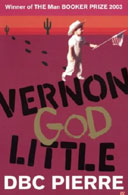
I am aware that I've come to the party a little behind the times on this one, being that it won the Booker in 2003, but I'm here now, ok?
It's possible that I'd read this before (see this post, where a similar thing happened, and where I extolled the virtues of a blog such as this to protect me from this experience in the future). But that didn't actually make any difference, since I have the memory of a goldfish and was therefore just as surprised at every event and masterful turn of phrase as I suppose I must have been the first time.
In fact, if having possibly read it before wasn't enough, I'll also confess to having a seen a play of it half way through this reading (thanks Kate LeM!). Turns out even actually knowing the ending couldn't ruin the reading. That's how brilliant the writing in this book is, it wouldn't matter what he wrote, you'd read it. Guaranteed fact.
So, here's a learning I made: the thoughts and encounters of Vern, a moody, self-obsessed teenage boy in the middle of nowhere, are indeed an allegory for the modern human experience, and they are marvellous. Take this:
I sense a learning: that much dumber people than you end up in charge. Look at the way things are. I'm no fucken genius or anything, but these spazzos are in charge of my every twitch. What I'm starting to think is maybe only the dumb are safe in this world, the ones who roam with the herd, without thinking about every little thing. But see me? I have to think about every little fucken thing.
Vern is the future, and he needs some learnings. And he gets them, boy. It's not until he is literally at death's door that he learns to play the game, and, admittedly, he learns from someone who appears to have lost the game, but the wisdom this man passes onto Vern is literally what sets him free:
'Boy, you really missed the boat. I'll make it simple, so's even fuckin you can understand. Papa God growed us up till we could wear long pants; then he licensed his name to dollar bills, left some car keys on the table, and got the fuck outta town ... Don't be lookin up at no sky for help. Look down here, at us twisted dreamers.' He takes hold of my shoulders, spins me around, and punches me towards the mirror on the wall. 'You're the God. Take responsibility. Exercise your power.'
...
'Big yourself up - watch any animal for clues. As for us humans - check this ... Learn their needs, and they'll dance to any fuckin tune you play.'
Amazing. So here's another learning I made: don't wait 8 years to read a really good book, spazzo.







